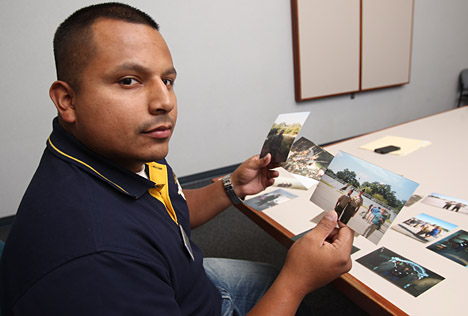
Jose Rosales joined the U.S. Marine Corps after Sept. 11. He returned to UT and completed his bachelor’s and master’s degrees, and he is pursuing a doctorate.
He had graduated from Waite High School and was the first in his family to attend college; he was a sophomore at The University of Toledo. But after his professor told the class the first plane hit the tower and he walked outside the Snyder Memorial Building onto the mall and talked to friends concerned about what happened, he decided he needed to rewrite the story of his life.
“It seemed to me that life had more of a purpose, more of a meaning. Everyone felt it,” said Rosales, who is now a graduate assistant in the Office of Multicultural Student Success working toward his PhD in the Foundations of Education Program. “I was on one path here studying math education, working part time, coaching wrestling — but decided to go a different route.”
Rosales joined the U.S. Marine Corps. and is finishing his commitment in the military reserve as a staff sergeant. He learned a discipline there he never would have known otherwise and since his return, has committed himself to education, in part thanks to his GI Bill, and to helping students. He completed his bachelor’s degree in sociology and received a master’s degree in higher education.
“Never in my wildest dreams did I think 10 years later I would be a student here at UT doing what I’m doing now,” he said. “But there is no road map for this. I now can relate to students in even more ways, including as a veteran.”
UT Police Chief Jeff Newton was a graduate student in sociology in 2011 as well as a campus police officer. He worked the third shift into the morning of Sept. 11 and then went to class, which is where he was when the planes crashed into the World Trade Center.
“I was in a small class when the attacks began, and I remember immediately my well-informed professors were already theorizing what was occurring and who was behind the attacks, and they were correct,” Newton said.
Like so many others did, his class gathered around a television to watch the tragedy unfold and get the latest information. That is what everyone did throughout that day, and Newton’s 12-hour shift as a campus police officer was “eerily quiet,” he said.
“On campus, there was little activity. All classes and activities were canceled. Students were relentlessly watching the media coverage and absorbing the frightening reality that thousands of people had lost their lives,” Newton said. “It was numbing.”
Since that day, the Police Department at UT and everywhere around the country began the process of updating procedures to prevent and respond to disasters. Now there are disaster plans, mutual aid agreements that allow agencies to provide assistance to other jurisdictions, communications systems for different agencies to communicate on shared channels, and increased intelligence gathering and sharing, Newton said.
“It changed the country. We are very different from what we were then; our global consciousness is elevated,” said Dr. Dan Johnson, who was president of the University at the time and now serves as the director of global initiatives.Johnson had become president of UT just months before Sept. 11 and was in Columbus meeting with Ohio university presidents for the first time when he learned of the attacks.
“Immediately, everyone was concerned the whole country could be under attack, and we decided to close campuses. I drove back to campus as fast as I could and walked the campus talking with students in the residence halls,” Johnson said.
On a personal note, Johnson was worried about his wife’s brother, Adm. Vernon Clark, who was chief of naval operations in the Pentagon. He was unharmed, but lost 42 staff members when a plane crashed into the headquarters of the Department of Defense.
“I could not be more proud of how students and our UT community handled this tragedy. The real leadership that emerged was from our students,” Johnson said. “Our campus really came together in a way that was unique to college campuses. There was a bonding there that a lot of people felt on campus going through this together.”